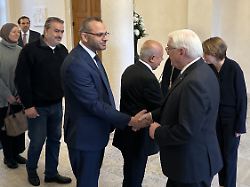Grueling questions every day
Al-Shifa surgeon doesn’t want to see any more injured people
November 26, 2023, 9:15 a.m
Just a few days ago, employees described Al-Shifa Hospital as a “death zone.” They talk about countless injuries and unclear prospects. A surgeon now describes the situation at the facility’s operating tables.
Ahmed Abunada “doesn’t want to see any more injured people.” In early November, the surgeon left Al-Shifa Hospital in the city of Gaza. He was now able to leave the Gaza Strip via the Egyptian Rafah border crossing and was received by Federal President Frank-Walter Steinmeier on Friday after his arrival in Germany with other Palestinians with German passports. The 47-year-old says he simply couldn’t stand the conditions in Gaza’s largest hospital any longer.
In the week in which he left the hospital, the situation became unbearable, says Ahmed Abunada: “We had no electricity, no water and no oxygen. But without oxygen you cannot operate.” After the start of the war between Israel and the radical Islamic Hamas, he was repeatedly faced with difficult decisions, says the chief physician of Al-Shifa’s vascular surgery department: should he let “this man” or “this woman” die; no time to patch up a seriously injured child, i.e. amputate – “these are very difficult decisions for a doctor to make.”
Ahmed Abunada studied in Germany and part of his family lives in Hesse. He has been living in Gaza with his wife and four children for eight years. One of them was injured before they left. Some of his relatives remained in the Gaza Strip, including his 85-year-old mother, who had to flee on foot to the south of the Palestinian territory. He is very worried about her.
“I worked there as a doctor, I didn’t notice anything”
He leaves largely uncommented on the fact that the Israeli army’s attacks on the Gaza Strip are a reaction to Hamas’ major attack on Israel on October 7th, in which, according to Israeli information, around 1,200 people were killed and around 240 others were abducted. Regarding the Israeli army’s allegations that Hamas had a command center in his hospital, Ahmed Abunada only says briefly: “I worked there as a doctor, I didn’t notice anything.”
The 47-year-old says he hopes that the international community will see “both sides” in the war and will particularly take into account the “humanitarian and human issues”.
